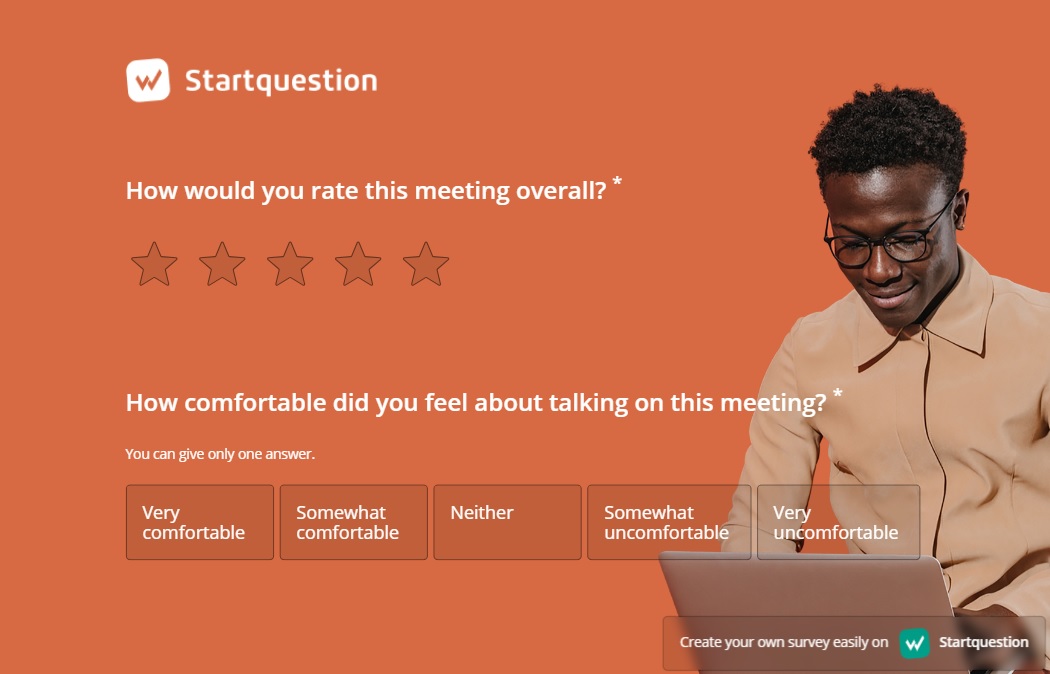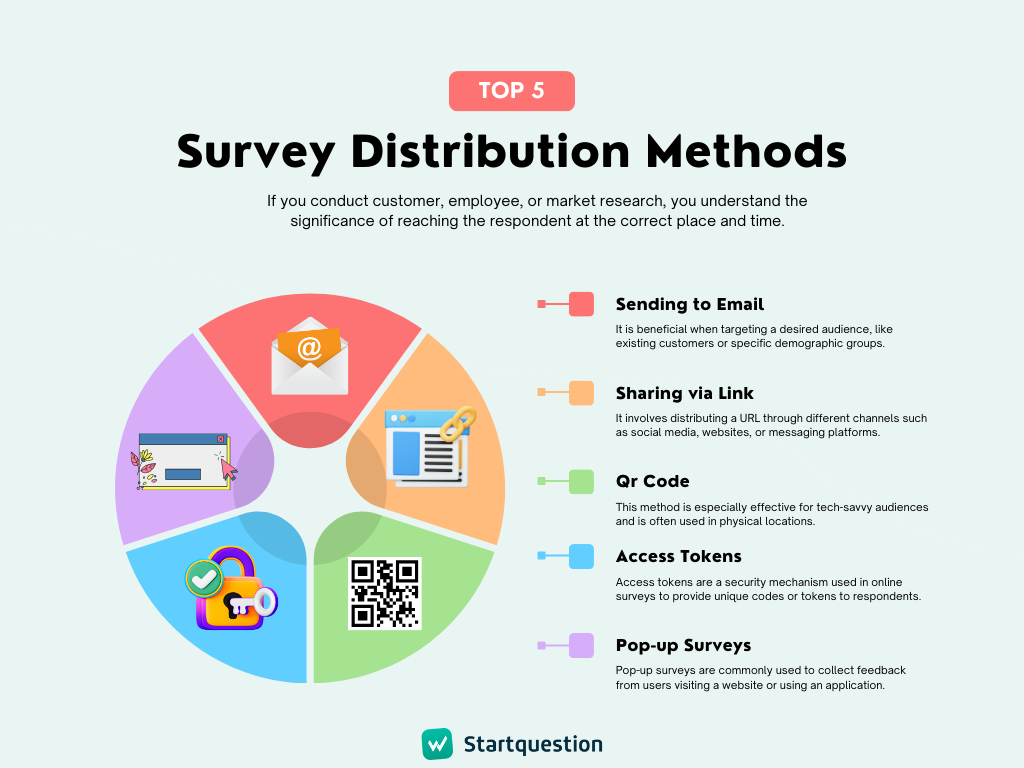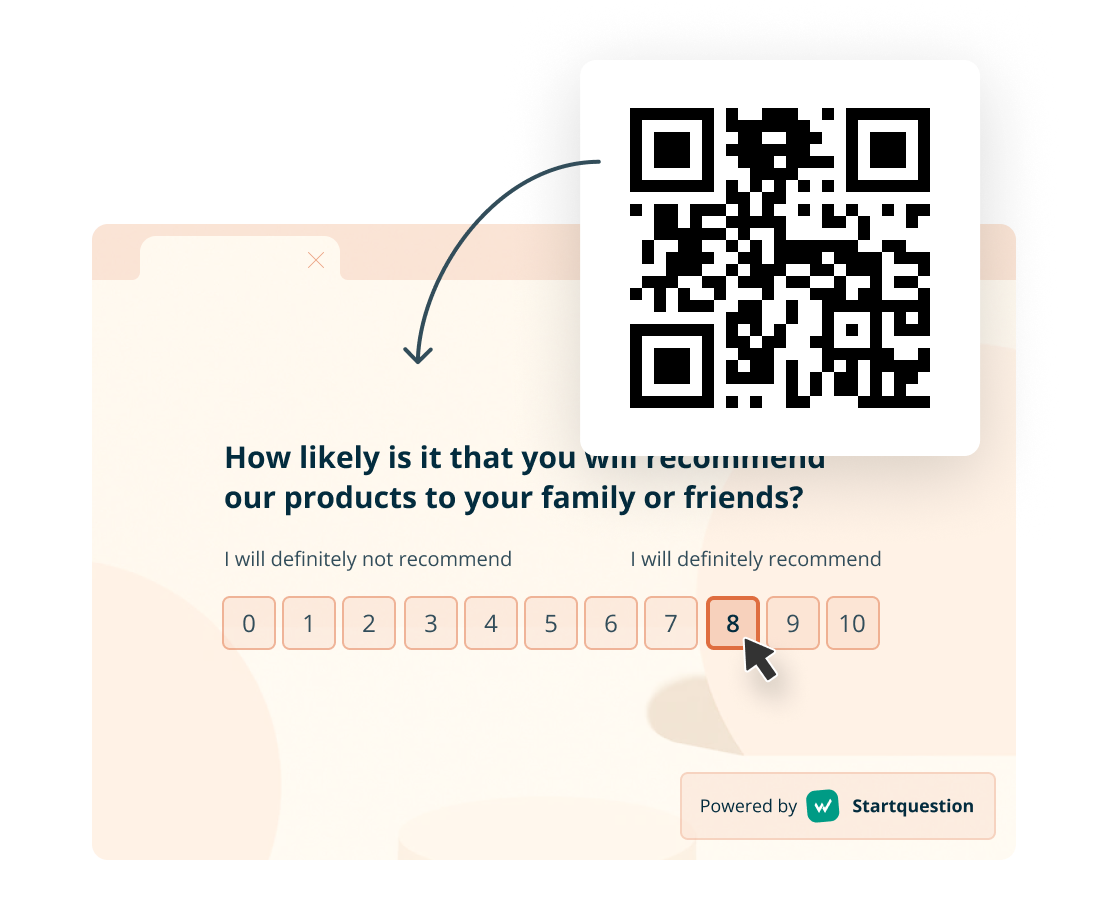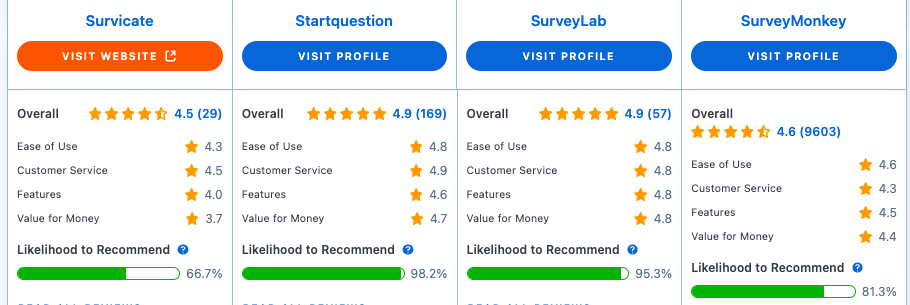Survey fatigue is the frustration and exhaustion that arises when businesses overwhelm their audience with too many survey requests. This often leads to a decline in response rates and can negatively affect customer relationships. If you’ve ever felt irritated by the flood of survey emails in your inbox, you’re not alone — customers, too, can feel this way when bombarded with excessive surveys.
After reading this article, you’ll be able to determine whether you’re sending too many surveys and learn practical tips on how to avoid survey fatigue.
Ready? Let’s get started! But first…
May I ask you something?
- How likely are you to recommend our store to your family or friends?
- How would you rate your recent visit to our pharmacy?
- On a scale of 1 to 5, how much did you enjoy your burger at our restaurant?
- How satisfied were you with your order from our online store?
- How easy was it to resolve your issue with our customer service department?
You get these kinds of questions all too often, don’t you? Online surveys are a great tool in the hands of CX managers and a source of knowledge about customer motivations and needs. However, used in excess, they can drive anyone insane.
Here’s what makes survey respondents drop questionnaires.
Types of Survey Fatigue
Surveys are a great way to get to know your customers, but, if you’re not careful, things can go wrong! What causes survey fatigue? Too many questions, poor design, or asking too often can leave your customers feeling exhausted — and that’s where survey fatigue comes in. In this chapter, we’ll explore five common types of survey fatigue and — later on — we’ll show you how to avoid them.
Questionnaire Fatigue
All customer survey types tips start with one thing: Don’t bore respondents to death
Questionnaire fatigue arises when a survey contains repetitive or overly similar questions. Poorly designed surveys frustrate participants, causing them to drop out or provide incomplete responses. To combat this, it’s essential to carefully plan each question to ensure it serves a purpose in the decision-making process. Avoid redundant questions, test your survey beforehand, and seek feedback to ensure clarity and relevance.
Dishonest Surveys
Did you know that a poor survey bias your data?
Dishonest surveys occur when participants feel their input won’t genuinely impact outcomes. This often happens when surveys are designed with biased or leading questions that push towards a preferred option. To avoid this, ensure transparency and avoid asking about topics that are non-negotiable. Be honest about your intentions and respect your audience by offering meaningful opportunities for feedback, fostering genuine engagement instead of frustration.

Frequency Fatigue
Consider your survey frequency. Don’t you send them too often?
Imagine being asked the same thing every day—eventually, you’d tune out, right? Sending too many surveys works the same way. Instead, let’s space things out and ask for feedback only when it really matters. When you ask at the right moment, your customers will appreciate it, and you’ll get more thoughtful responses with less survey frequency.
Too Long Surveys
A survey request is like asking a stranger for a favor. It is easy to discourage this person.
Long surveys are like trying to assemble a giant wardrobe with too many steps — it can be overwhelming! Keep it short and sweet, and only ask the questions that are truly necessary. If participants know the survey won’t take forever, they’re much more likely to stick with it and give their best answers. Clear, focused surveys & less time for survey completion = happy respondents.
Design Fatigue
That kind of fatigue occurs when a survey is poorly designed—maybe the layout is confusing, the instructions are unclear, or it’s not intuitive to navigate. When respondents struggle to figure out what to do next or how to answer, they can quickly become frustrated and abandon the survey altogether. A clear, user-friendly design can help prevent this kind of fatigue and improve the overall survey results and experience.
Negative Consequences of Survey Fatigue
Survey quitters. What research says about them? The paper titled “Exhausting or tiring? Evidence on respondent fatigue in long surveys” published in the Journal of Development Economics (March 2023) gives the following consequences of survey fatigue:
Low Response Rates
When customers experience survey fatigue, they become less likely to participate in surveys altogether. The research suggests that longer surveys, especially those exceeding an hour, can cause respondents to skip questions or drop out entirely, leading to incomplete data. This means fewer responses and a loss of valuable insights.
Skewed Results
As survey fatigue sets in, respondents may start to rush through the questions, providing inaccurate or incomplete answers. The data shows that the number of items reported can drop by up to 64% when surveys become too lengthy. This can result in biased data, making it difficult for businesses to draw reliable conclusions from the feedback.
Damage to Brand
Over-surveying or poor survey design can frustrate customers, leading to a negative perception of the brand. If customers feel overwhelmed or ignored after repeatedly providing feedback, they may lose trust in the company. The research highlights that cognitive burden plays a significant role in driving fatigue, which can damage long-term customer relationships.
Customers Churn
Ultimately, when survey fatigue pushes customers too far, they may disengage completely—not only from the surveys but from the brand itself. Continuous requests for feedback without clear value or change can lead to customer churn, as customers may seek alternatives that respect their time and provide better interactions.
As we know the negative consequnces of survey fatigue, let’s see what they look like in practice.

Examples of Survey Fatigue
In each of these examples, sending too many surveys or making them too long can cause survey fatigue. By keeping questions focused, sending surveys at the right time, and minimizing repetition, you can ensure better responses and keep your customers engaged.
Post-Purchase Satisfaction Survey
Sample survey questions
1. How would you rate the product you just bought?
2. On a scale of 1-10, how satisfied are you with your overall experience?
3. Would you recommend this product to someone else?
4. Did you face any issues during the checkout process?
Reasons of abandoning surveys
Even though such transactional surveys are brief, sending it immediately after every purchase can quickly lead to survey fatigue. Imagine being asked to rate each minor purchase you make—it can become annoying, and customers might start ignoring these requests. Frequent surveys can make customers feel like their feedback isn’t valued, reducing engagement over time.
Customer Service Feedback Survey
Sample survey questions
1. Were you happy with the outcome of your recent service request?
2. How helpful was our support team, on a scale of 1-5?
3. How would you rate the ease of contacting customer service?
4. What suggestions do you have for improving our service?
Reasons of abandoning surveys
While this survey asks important questions, it can cause frustration if sent while an issue is still unresolved. Customers may not be in the right mindset to provide constructive feedback, leading to either skipped questions or negative responses. Sending surveys too frequently, especially after every minor interaction, can cause customers to disengage.

Detailed Customer Experience Survey
Sample survey questions
1. How would you rate your overall experience with us?
2. On a scale of 1-10, how likely are you to recommend our brand?
3. Please rank the following aspects: product quality, customer service, and delivery speed.
4. How satisfied are you with the shipping time?
5. What could we improve in your next experience?
Reasons of abandoning surveys
This survey offers a combination of rating and open-ended questions, which can be valuable for gathering specific feedback. However, long surveys that ask for detailed responses can become tedious, especially when sent frequently. When customers see multiple ranking questions, they might rush through the answers or abandon the survey, reducing the quality of feedback. Balancing these longer surveys with shorter, more targeted ones can help reduce fatigue.
Tips to Avoid Survey Fatigue
To make sure your surveys are engaging, easy to complete, and valuable for both you and your customers, here are some helpful tips to drive massive feedback and avoid survey fatigue.
What to avoid when creating surveys? After analyzing confessions of survey quitters we are certain that for survey respondents it is important that you will:
Keep Your Survey Length Short
When it comes to surveys, less is more. Just like assembling furniture, you want the process to be quick and simple. Long surveys are overwhelming, and most people won’t have the time or patience to finish them. Keep your questions short and focused, asking only what is necessary to gather the insights you need. And remember, multiple-choice questions or simple rating scales are much easier for people to respond to than open-ended questions, which require more effort. The shorter and more concise your survey is, the more likely people are to complete it.
Express the Value of Your Survey
No one likes to feel like they’re wasting time, so it’s important to clearly communicate the value of your survey to your respondents. Let them know why their feedback matters and how it will be used to improve their experience. For example, if you’re asking about a recent purchase, explain how their input will help prevent future issues or improve your product. Showing that you genuinely care about their opinion makes respondents feel valued, and they’ll be more likely to engage thoughtfully with your questions. Plus, implementing feedback shows you’re not just asking for the sake of it — you’re listening!
Send Surveys at the Proper Time
Timing is everything! Sending a survey immediately after a customer interaction, like right after a purchase or a customer service call, ensures the experience is still fresh in their minds. However, avoid interrupting customers while they are shopping or busy with your service. It’s like asking for feedback before they’ve even finished assembling the bookshelf — not very helpful! Choose a time when customers can reflect on their experience without distractions, and make sure it’s not too long after their interaction, or they may forget important details.
Speak Clearly and Directly
Your customers are busy people, so make your survey as easy to understand as possible. Avoid using technical jargon or complicated language — clear and direct questions will help keep respondents from feeling overwhelmed. For example, instead of asking broad questions like, “What did you think of our service?” be specific, such as “How would you rate the ease of placing an order?” The easier it is to understand and answer your questions, the less likely people are to get fatigued and the more likely you are to gather useful, actionable insights.
Are you looking for survey logic expert tips and more helpful content? Visit our blog and Help Center.

Let Us Help You Combat Survey Fatigue
Customer experience surveys are a goldmine of insights, but only when handled with care and precision. Thoughtfully crafted questions at the right time can open the door to valuable feedback that helps shape better products, services, and customer relationships.
It’s not just about asking the right questions — it’s about listening in a way that respects your customers’ time and effort, creating a win-win situation for both your business and the people you serve.
At Startquestion, we’re not only experts in online surveys but also in helping companies implement comprehensive CX strategies. We’d love to share our experience with you, guiding your business to gather the most meaningful feedback without overwhelming your customers.
If you’re ready to explore how we can elevate your customer experience efforts, feel free to connect with one of our experts. Let’s talk about how to unlock the full potential of your customer insights!




